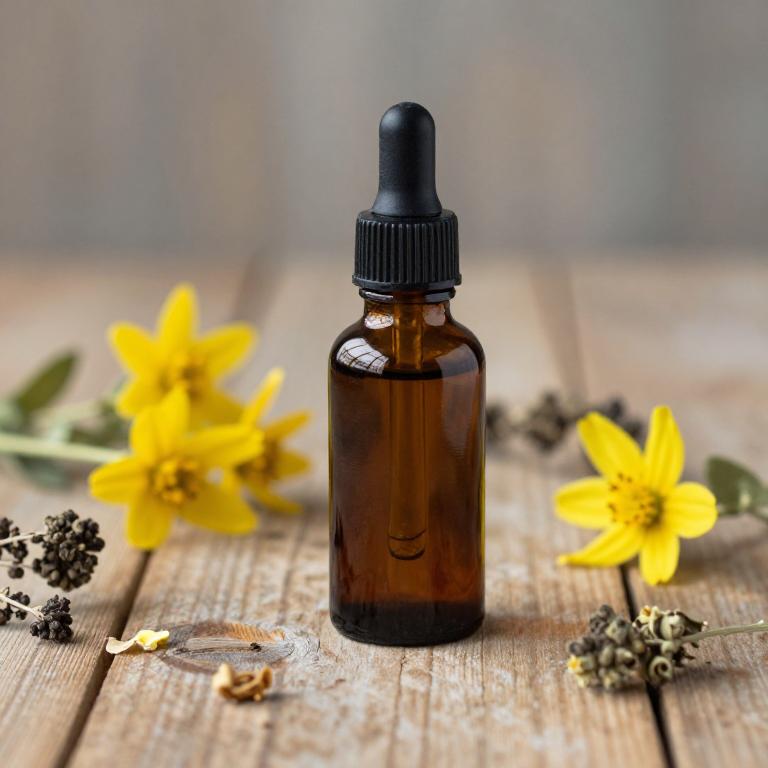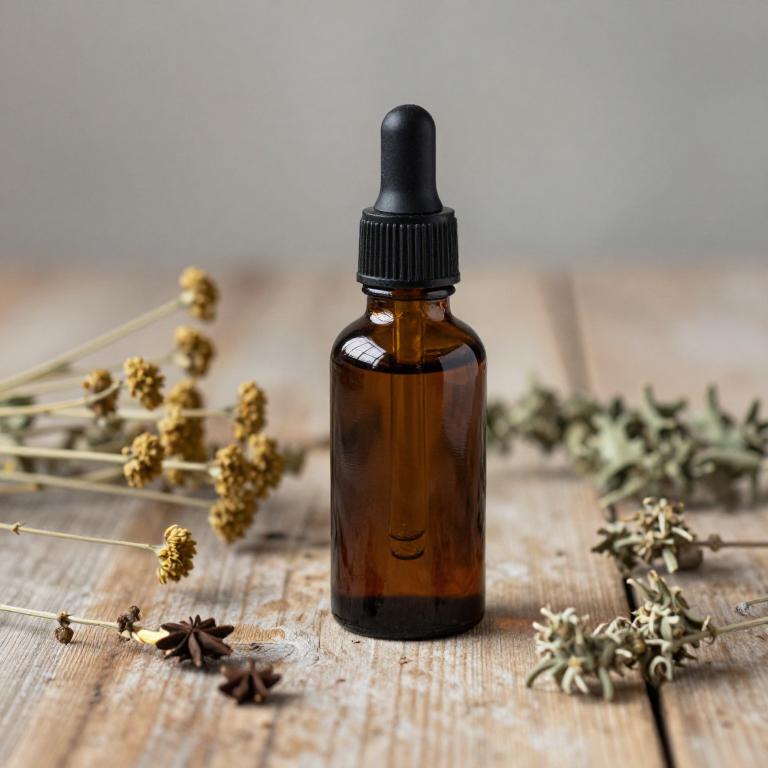10 Best Herbal Tinctures For Hoarse Voice

Herbal tinctures are concentrated liquid extracts made from medicinal plants and are commonly used to address a variety of health issues, including a hoarse voice.
These tinctures often contain herbs such as thyme, licorice root, and sage, which are known for their soothing and anti-inflammatory properties. They work by reducing irritation and inflammation in the throat, thereby helping to ease the symptoms of hoarseness. Herbal tinctures are typically taken orally, either directly or diluted in water, and can be a natural alternative to conventional remedies.
However, it is advisable to consult a healthcare professional before use, especially for prolonged or severe cases of hoarseness.
Table of Contents
- 1. Echinacea (Echinacea purpurea)
- 2. Thyme (Thymus vulgaris)
- 3. Stinging nettle (Urtica dioica)
- 4. Mountain arnica (Arnica montana)
- 5. Chaste tree (Vitex agnus-castus)
- 6. Ginger (Zingiber officinale)
- 7. Peppermint (Mentha piperita)
- 8. St. john's wort (Hypericum perforatum)
- 9. Parsley (Petroselinum crispum)
- 10. Licorice (Glycyrrhiza glabra)
1. Echinacea (Echinacea purpurea)

Echinacea purpurea herbal tinctures are commonly used to support the immune system and may help alleviate symptoms of a hoarse voice by reducing inflammation and promoting throat healing.
These tinctures are typically made by soaking the dried roots and flowers of the echinacea plant in alcohol, creating a concentrated herbal remedy. While there is limited scientific evidence specifically linking echinacea to the treatment of hoarseness, some studies suggest that its anti-inflammatory and antiviral properties may help soothe irritated throats. It is often used as a complementary therapy alongside other remedies for voice-related issues.
However, individuals should consult with a healthcare provider before using echinacea, especially if they have allergies or are taking other medications.
2. Thyme (Thymus vulgaris)

Thymus vulgaris, commonly known as thyme, is a popular herb used in herbal tinctures to address a variety of health issues, including hoarseness of the voice.
The tinctures are typically made by steeping the dried leaves and flowers of the thyme plant in alcohol, which helps extract its active compounds such as thymol and carvacrol. These compounds are known for their antimicrobial, antispasmodic, and expectorant properties, which can help reduce inflammation and soothe irritated vocal cords. Thyme tinctures are often used in traditional medicine to alleviate symptoms of laryngitis, coughs, and throat infections that may lead to a hoarse voice.
However, it is important to consult a healthcare professional before using thyme tinctures, especially for prolonged periods or in combination with other medications.
3. Stinging nettle (Urtica dioica)

Urtica dioica, commonly known as stinging nettle, has been traditionally used in herbal medicine for its potential therapeutic properties.
Urtica dioica herbal tinctures are often prepared by soaking the dried plant in alcohol to extract its active compounds. These tinctures may support throat health and can be used as a natural remedy for hoarse voice due to their anti-inflammatory and soothing effects. The high concentration of minerals and antioxidants in stinging nettle may help reduce irritation and promote vocal cord healing.
However, it is advisable to consult a healthcare professional before using urtica dioica tinctures, especially for prolonged use or in combination with other medications.
4. Mountain arnica (Arnica montana)

Arnica montana herbal tinctures are traditionally used to support the healing of the vocal cords and alleviate symptoms of a hoarse voice.
This potent herb is known for its anti-inflammatory and analgesic properties, which can help reduce swelling and irritation in the throat. When applied externally as a tincture, it may promote circulation and ease discomfort associated with vocal strain or inflammation. However, it is important to note that arnica should not be ingested and should be used with caution, especially on broken skin.
While some people find relief from using arnica tinctures for hoarseness, it is advisable to consult a healthcare professional before use, particularly for prolonged or severe cases.
5. Chaste tree (Vitex agnus-castus)

Vitex agnus-castus, commonly known as chasteberry, is a traditional herbal remedy that has been used for centuries to support hormonal balance and alleviate various health conditions.
When formulated into a tincture, Vitex agnus-castus may help reduce inflammation and soothe the vocal cords, making it a potential natural remedy for hoarse voice. Its adaptogenic properties may support the body's stress response, which can indirectly improve vocal health by reducing strain on the voice. While scientific evidence is limited, some users report improved vocal clarity and reduced throat irritation after using Vitex agnus-castus tinctures.
As with any herbal supplement, it is advisable to consult with a healthcare professional before use, especially for those with existing medical conditions or taking other medications.
6. Ginger (Zingiber officinale)

Zingiber officinale, commonly known as ginger, has been traditionally used in herbal medicine for its anti-inflammatory and soothing properties.
Ginger tinctures can be beneficial for individuals experiencing a hoarse voice, as they may help reduce inflammation in the throat and ease irritation. The active compounds in ginger, such as gingerol and shogaol, are believed to support respiratory health and promote healing of the vocal cords. When used as a tincture, ginger can be diluted in water or taken directly under the tongue for quicker absorption.
However, it is important to consult with a healthcare professional before using ginger tinctures, especially for prolonged periods or in conjunction with other medications.
7. Peppermint (Mentha piperita)

Mentha piperita, commonly known as peppermint, is often used in herbal tinctures to help alleviate symptoms of a hoarse voice.
The essential oils in peppermint, particularly menthol, have soothing and anti-inflammatory properties that can reduce irritation in the throat. When used as a tincture, peppermint can help relax the muscles in the respiratory tract, making it easier to breathe and potentially easing vocal strain. It is typically taken in small doses, either directly or diluted in water, to avoid potential side effects such as stomach upset.
While peppermint tinctures may provide temporary relief for hoarseness, they should not replace professional medical advice, especially if the cause of the hoarse voice is unknown or persistent.
8. St. john's wort (Hypericum perforatum)

Hypericum perforatum, commonly known as St. John's Wort, is a herbal plant that has been traditionally used for its potential therapeutic properties.
While it is well-known for its use in treating mild depression, it has also been explored for its effects on respiratory conditions, including hoarse voice. Hypericum perforatum tinctures are believed to have anti-inflammatory and soothing properties that may help reduce irritation in the throat and vocal cords. These tinctures are often prepared by soaking the dried herb in alcohol, allowing the active compounds to be extracted for use.
However, it is important to consult a healthcare professional before using St. John's Wort, as it may interact with certain medications and is not a substitute for medical treatment.
9. Parsley (Petroselinum crispum)

Petroselinum crispum, commonly known as parsley, has been traditionally used in herbal medicine for its soothing properties, including its potential to alleviate hoarse voice.
The tinctures made from the fresh or dried leaves of this herb are believed to support throat health due to their high concentration of essential oils and antioxidants. These tinctures may help reduce inflammation and irritation in the vocal cords, promoting smoother and clearer speech. When used as a complementary remedy, parsley tinctures can be a natural option for those seeking relief from occasional hoarseness.
However, it is advisable to consult a healthcare professional before using any herbal remedy, especially if symptoms persist or are severe.
10. Licorice (Glycyrrhiza glabra)

Glycyrrhiza glabra, commonly known as licorice root, is widely used in herbal medicine for its soothing properties, particularly in addressing hoarse voice.
The tincture form of licorice root is prepared by soaking the dried root in alcohol, allowing the active compounds such as glycyrrhizin and flavonoids to be extracted. This herbal tincture is known to reduce inflammation and irritation in the throat, making it beneficial for individuals experiencing hoarseness due to overuse, infections, or allergies. Its demulcent properties help to coat and protect the mucous membranes of the throat, promoting healing and easing discomfort.
However, long-term use of licorice root tinctures should be monitored due to potential side effects such as hypertension, especially in individuals with existing health conditions.